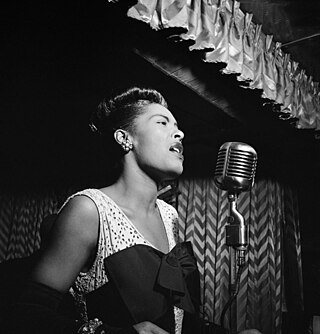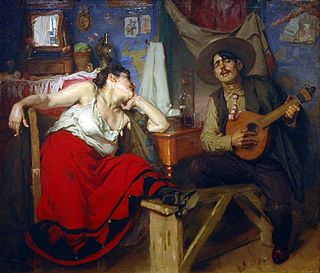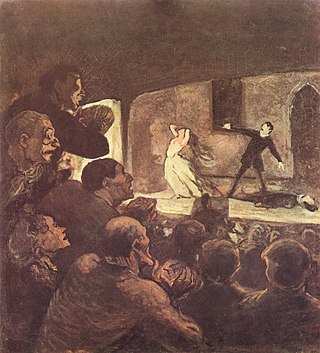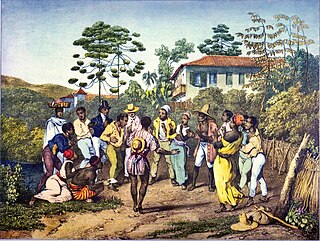Related Research Articles

A ballad is a form of verse, often a narrative set to music. Ballads derive from the medieval French chanson balladée or ballade, which were originally "dance songs". Ballads were particularly characteristic of the popular poetry and song of Britain and Ireland from the Late Middle Ages until the 19th century. They were widely used across Europe, and later in Australia, North Africa, North America and South America.

A song is a musical composition performed by the human voice. This is often done at distinct and fixed pitches (melodies) using patterns of sound and silence. Songs contain various forms, such as those including the repetition and variation of sections.

Fado is a music genre which can be traced to the 1820s in Lisbon, Portugal, but probably has much earlier origins. Fado historian and scholar Rui Vieira Nery states that "the only reliable information on the history of fado was orally transmitted and goes back to the 1820s and 1830s at best. But even that information was frequently modified within the generational transmission process that made it reach us today."

A modern melodrama is a dramatic work in which the plot, typically sensationalized and for a strong emotional appeal, takes precedence over detailed characterization. Melodramas typically concentrate on dialogue that is often bombastic or excessively sentimental, rather than action. Characters are often flat, and written to fulfill stereotypes. Melodramas are typically set in the private sphere of the home, focusing on morality and family issues, love, and marriage, often with challenges from an outside source, such as a "temptress", a scoundrel, or an aristocratic villain. A melodrama on stage, filmed, or on television is usually accompanied by dramatic and suggestive music that offers cues to the audience of the drama being presented.

Accompaniment is the musical part which provides the rhythmic and/or harmonic support for the melody or main themes of a song or instrumental piece. There are many different styles and types of accompaniment in different genres and styles of music. In homophonic music, the main accompaniment approach used in popular music, a clear vocal melody is supported by subordinate chords. In popular music and traditional music, the accompaniment parts typically provide the "beat" for the music and outline the chord progression of the song or instrumental piece.
Samba is a lively dance of Afro-Brazilian origin in 2/4(2 by 4) time danced to samba music.

Lundu is a style of Afro-Brazilian music and dance with its origins in the African Bantu and Portuguese people.
The morna is a music and dance genre from Cape Verde.

Capoeira music is the traditional musical accompaniment used in Afro-Brazilian art capoeira, featuring instruments like berimbau, pandeiro, atabaque, agogô, and reco-reco. The music plays a crucial role in capoeira roda, setting the style the energy of a game.

Manuel Maria Barbosa l'Hedois du Bocage, most often referred to simply as Bocage, was a Portuguese Neoclassic poet, writing at the beginning of his career under the pen name Elmano Sadino.

The Portuguese guitar or Portuguese guitarra is a plucked string instrument with twelve steel strings, strung in six courses of two strings. It is one of the few musical instruments that still uses watch-key or Preston tuners. It is iconically associated with the musical genre known as Fado.
Samba-canção is, in its most common acceptance or interpretation, the denomination for a kind of Brazilian popular songs with a slow-paced samba rhythm.
The Bachianas Brasileiras are a series of seven suites by the Brazilian composer Heitor Villa-Lobos, written for various combinations of instruments and voices between 1930 and 1945. They represent a fusion of Brazilian folk and popular music on the one hand and the style of Johann Sebastian Bach on the other, as an attempt to freely adapt a number of Baroque harmonic and contrapuntal procedures to Brazilian music. Most of the movements in each suite have two titles: one "Bachian", the other Brazilian.
Nicolau Tolentino de Almeida, from Lisbon, was the foremost Portuguese satirical poet of the 18th century. Beginning at age 20, Tolentino studied law for three years at the University of Coimbra; he then ended those studies to teach rhetoric. He was sent to Lisbon in 1776 to fill a post, and was named professor of rhetoric a year later. His interests soon shifted once again, from teaching, to public office. He wrote against the Marquis of Pombal, and therefore gained the favor of Pombal's successor. He was awarded with a sinecure office in the royal administration. In 1790, he was honored with the title of knight of the royal family.

Batuque (drumming) was a general term for various Afro-Brazilian practices in the 19th century, including music, dance, fighting game and religion.

Domingos Caldas Barbosa was a Colonial Brazilian Neoclassic poet and musician, famous for creating the modinha. He wrote under the pen name Lereno.

Antonio Carlos Ribeiro Barbosa Lima was a Brazilian classical and jazz guitarist. He spent most of his professional life as a resident in the United States, devoting much of his time as a recitalist on international concert tours. He appeared often as a soloist and with orchestras.
Barbosa is a Portuguese and later also Southern Galician surname. It may refer to:

Ernesto Joaquim Maria dos Santos, most known as Donga, was a Brazilian guitarist and composer. He composed what is considered the first recorded samba, the 1916 song Pelo Telefone.

José Ramos Tinhorão was a Brazilian journalist, essayist, music critic, music historian and author of many books on Brazilian popular music. He was a lifelong detractor of the Bossa Nova movement, which he saw as pasteurized Jazz music assembled in the tropics.
References
- ↑ Collins Portuguese Dictionary. Great Britain: HarperCollins Publishers. 2010. ISBN 978-0-06-201813-7.
- ↑ Nery, Rui Vieira (2004). Para uma história do fado (in Portuguese). Lisbon: Público-Corda Seca. p. 31. ISBN 972-8892-32-2.
- ↑ Fryer, Peter (1 March 2000). Rhythms of Resistance . Pluto Press. pp. 142–143. ISBN 0-7453-0731-0.